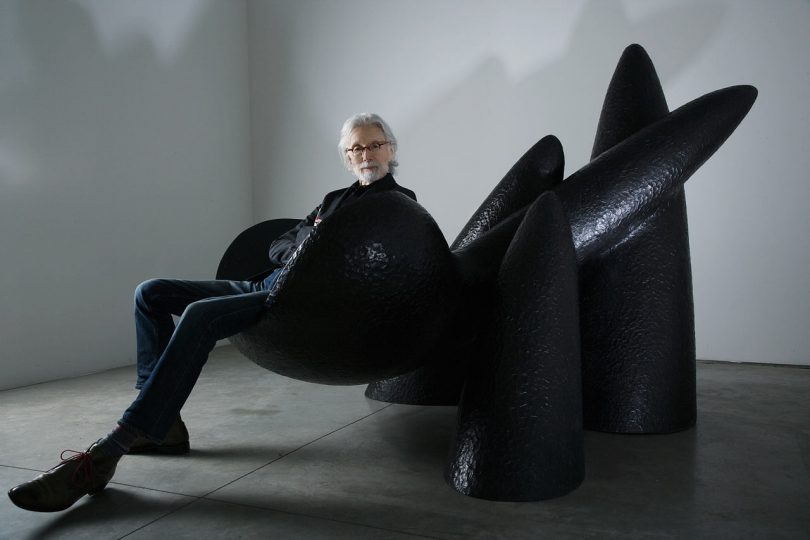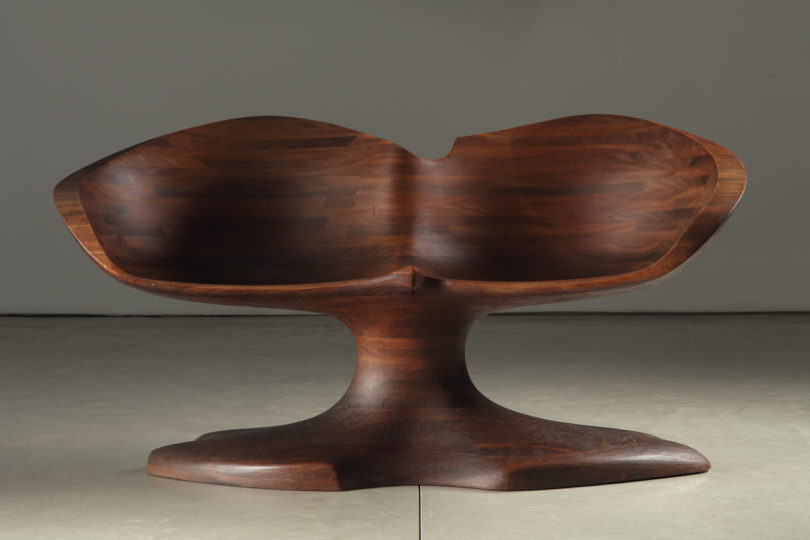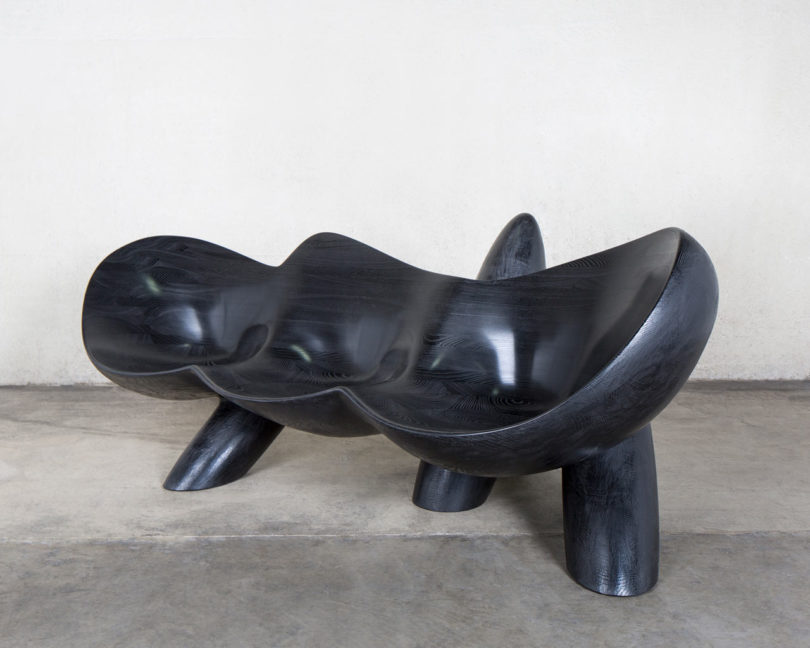Wendell Castle was known the world over for his contribution to the field of art and design, most notably his curvaceous and sculptural wooden pieces. I remember getting a personal tour of his workspace and studio, and it was an extraordinary space with room after room filled with machines and prototypes and materials. He was such an inspiration and a one of a kind. He will be very missed, but his legacy and influence on art and design will go on.

Wendell Castle, Black Widow \\\ Courtesy of Friedman Benda and Wendell Castle \\\ Photo by Lazer Inc.
RIT Professor and Chair of Industrial Design at the Rochester Institute of Technology, designer Josh Owen remembers him:
During my recruitment and onboarding to RIT 8 years ago, I was delighted to learn that world-renown artist, Wendell Castle was an active member of the RIT community. My new colleague, RIT industrial design professor and then Chair of ID, Stan Rickel, had developed a relationship with Wendell over several years prior to my joining the faculty and explained to me that Wendell had been a regular contributor to the ID department since their friendship was forged. When I asked why Wendell would be interested in industrial design, Stan explained: “Wendell trained to be an industrial designer. While he went on to lead the American Craft movement, his process is familiar to us. He speaks our language brilliantly”.
As a student of design history and its many streams of influence, I was already aware of Wendell’s work and its place within the pantheon of experimentation relative to industrial design. I was delighted to help further integrate Wendell into our work in the department given Wendell’s enthusiasm for doing so. To that end, Wendell regularly taught a graduate seminar allowing students to interact with him in an intimate setting. Wendell often joined ID Professor Gary Molinari’s undergraduate ID students by offering live drawing demonstrations. He also regularly opened his studio to allow our cohort to peek behind the scenes into the inner workings of his unique practice, down the street from RIT.
For the past 7 years, I have brought students to design week in New York City each May and Wendell has always offered to guide student groups through the many galleries which represent him on memorable walking tours where we had to do our best to keep up with his pace. Each year since taking on the Chairmanship of ID, I have hosted an informal ‘ID Faculty & Friends Back to School Party’ at my home at the end of summer break. Wendell always attended and mixed casually with our faculty, old and new making them feel comfortable even as they knew that they were in the company of one of the art and design world’s great treasures.
Several years ago, I began an archival initiative in my work in the Vignelli Center for Design Studies called “Product Timecapsule”. The idea was to seek iconic modernist products to add in as hands-on study collections focusing on the developmental process behind the resulting end-products. To achieve these ends we must find useful examples of preeminent works of design which, through their associated artifacts of process, tell rich stories of innovation useful to students and scholars. When I asked Wendell what it would take to add his iconic 1969 molded fiberglass Molar Chair in to this initiative, he replied simply, “I’m sure it will fit in the back of your Honda Element”.
One of our former RIT ID Graduate students, Bridget Sheehan, who currently teaches classes for us and is also a full-time employee in the Castle Studio has been, as Wendell likes to say, “my right hand” in his for the past 3 years, providing living proof of the thread that binds us.
On a personal note, Wendell and I had been working together with colleague Wendy Marks of Shop One and Wendell’s friend Kevin Marks on a philanthropic project, leveraging each of our personal ‘brands’ as designers to the service of RIT. We had been co-designing a set of bookends which we are producing in a limited quantity in order to generate funds for improvements in the industrial design studio at RIT. It has been a great honor but also a pure joy to ‘play’ with Wendell in the way that we designers are most at home. A pencil each and a few sheets of white paper is all we needed to be in our element. I’ll never forget those wonderful moments where we were behaving like Jazz musicians performing live, exchanging the ideas that led to the final prototypes for this project; Bookends: Supporting ID Education at RIT. In some ways, those sessions represented everything Wendell has gifted us with: His enthusiasm, his eagerness to collaborate and share and his generosity to deliver his intentions with tangible and always elegant results. We will not forget the joie de vivre Wendell shared with us at RIT, in Rochester and beyond that etched those into the minds of our students, faculty and to me.
Thank you, Josh, for sharing your personal story and thanks to Wendell Castle for the infinite inspiration and legacy of art + design. We’ll leave you with Wendell Castle’s 10 Adopted Rules of Thumb:
1. If you are in love with an idea you are no judge of its beauty or value.
2. It is difficult to see the whole picture when you are inside the frame.
3. After learning the tricks of the trade, don’t think you know the trade.
4. We hear and apprehend what we already know.
5. The dog that stays on the porch will find no bones.
6. Never state a problem to yourself in the same terms it was brought to you.
7. If it’s offbeat or surprising it’s probably useful.
8. If you do not expect the unexpected, you will not find it.
9. Don’t get too serious.
10. If you hit the bullseye every time the target is too near.
from WordPress https://connorrenwickblog.wordpress.com/2018/01/25/remembering-wendell-castle-1932-2018/











No comments:
Post a Comment